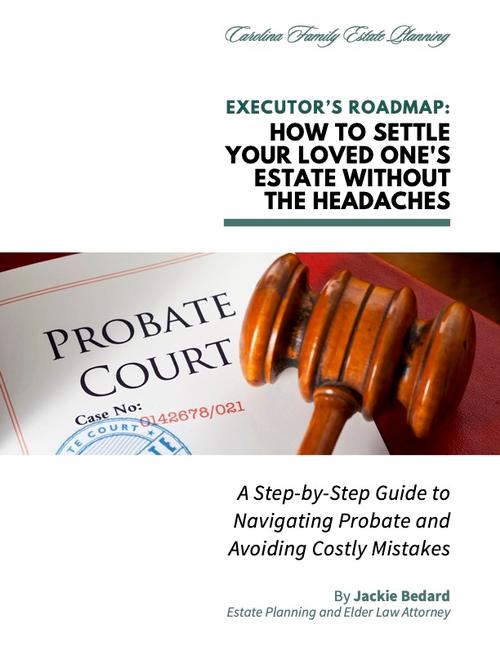
One of the roles of the executor of the decedent’s will is completing an inventory of all the decedent’s (person who died) assets. Knowing the value of a decedent’s assets can allow the executor to divide the estate properly and account for every cent during this division. It can also ensure that the executor knows of any ongoing debts or bills the decedent owes.
However, if you are an executor of a loved one’s estate, you may not know how to conduct this inventory or what the deadlines are for doing so. With that in mind, we’ve put together this blog to help you understand everything you need to know about 90-day inventories in North Carolina and how hiring a probate lawyer from Carolina Family Estate Planning can help you navigate through the process.
What Is the 90-Day Inventory?
 The 90-day inventory, also known as form AOC-E-505, is an inventory of the decedent’s estate. The inventory form can also be found on the Administrative Office of the Courts’ website. This inventory lists all the bank accounts, assets, and personal property in the decedent’s possession at the time of their passing. Filling out this form is essential for the following reasons:
The 90-day inventory, also known as form AOC-E-505, is an inventory of the decedent’s estate. The inventory form can also be found on the Administrative Office of the Courts’ website. This inventory lists all the bank accounts, assets, and personal property in the decedent’s possession at the time of their passing. Filling out this form is essential for the following reasons:
- To gain a general understanding of where the decedent kept their money
- To ensure that the beneficiaries receive the correct portion of the estate
- To determine the worth of personal property and real estate
This inventory is due within three months of the decedent’s passing. However, the values on the form should correlate to the decedent’s worth on the date of death, not on the date of filing.
North Carolina state law only requires executors to fill out inventory forms for estates worth more than $20,000. If you are the executor of an estate worth less than $20,000, you can fill out an Affidavit for Collection of Personal Property of Decedent instead.
How to Complete a 90-Day Inventory of the Decedent’s Estate
If you are the executor for a loved one’s estate, filling out the 90-day inventory is one of your primary responsibilities. This form details all of the information you must include in the inventory. On the 90-day inventory form, you will need to list the following information:
- The decedent’s county of residence
- The decedent’s name
- Any accounts in the sole name of the decedent and their value
- Any joint accounts, the percentage the decedent owned, and their value
- Any stocks and bonds in the name of the decedent, the percentage they owned, and their value
- The value of cash or any undeposited checks the decedent had
- The decedent’s personal property, such as vehicles, equipment, and household furnishings and their value
- Any real estate, sold and unsold, willed to the estate and its value
If you would need additional funds to pay the decedent’s claims, you can also add this property to the inventory sheet:
- Joint accounts with right of survivorship and their value
- Investments jointly owned with right of survivorship and their value
- Any other personal property recoverable
Additionally, if there are any claims for wrongful death, you will need to state these on the inventory sheet. You’ll need to list the attorney’s name and contact information along with the state and county that the claim is within.
Upon signing the inventory form, you agree that the information you listed is accurate to the best of your knowledge. You also state that you have not purposefully left out any of the decedent’s assets or personal property.
Keep in mind that you will need to sign the form in the presence of a notary before submitting it to the Court.
How a Carolina Family Estate Planning Probate Lawyer Can Help
Completing a 90-day inventory may sound straightforward enough, but unfortunately, complications can arise within the process. For example, if a beneficiary complains that you have not listed the assets correctly, you may face a theft claim or need to recalculate the property value.
Along with filling out a 90-day inventory, you’ll also need to complete other forms, such as an Affidavit of Notice to Creditors and an Estate Tax Certification. All the steps in the probate process have their own deadlines and require you to obtain specific information and documents from the decedent’s property. Altogether, navigating probate can be confusing and overwhelming, especially while trying to grieve your loved one’s death. However, hiring a “probate attorney near me” or a will lawyer can ease the process significantly.
At Carolina Family Estate Planning, we have helped numerous North Carolina clients navigate the inventory and probate process. When you work with our team, you can receive knowledgeable guidance and helpful representation to ensure that you complete all the necessary steps of being an executor. We’re here to help you get your ducks in a row. Contact one of our Carolina Family Estate Planning probate lawyers today at (919) 443-3035, or schedule a needs-assessment call with a member of our friendly, professional legal team.




